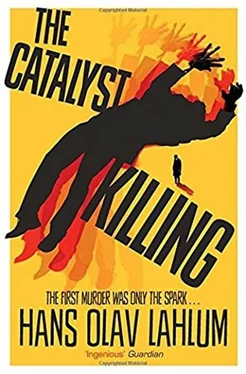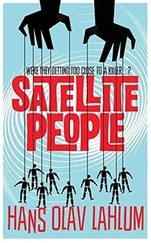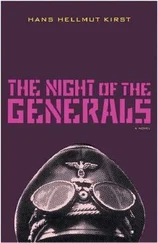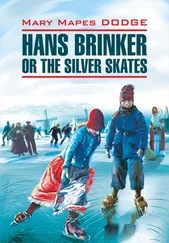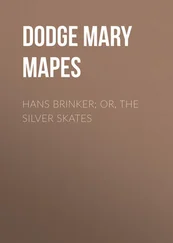When I asked if it could have been Falko Reinhardt she saw going in the other direction that stormy night, Miriam Filtvedt Bentsen nodded eagerly. The thought had crossed her mind and was certainly not entirely implausible.
‘In which case, he then obviously left the cabin of his own accord, having first planned his escape,’ she remarked in a matter-of-fact voice. I nodded my cautious agreement and said that there was much to indicate that.
There was nothing more to be found indoors. So I asked Miriam Filtvedt Bentsen to show me the way to the cliff where Falko’s shoe had been discovered the morning after he disappeared.
We found it on the third attempt. The distance to the cliff was about a quarter of a mile. When we got there, I saw the stone beside which Falko Reinhardt’s shoe had been found. It was a large white stone, almost three feet tall, and had sheltered the shoe from the wind.
The view from the cliff was spectacular. The drop was about three hundred feet down onto scree, and Falko Reinhardt could hardly have survived if he had fallen over the edge in the storm. Both Miriam Filtvedt Bentsen and I allowed ourselves to be captivated by the view for a few moments. But, as was to be expected, we found no new traces of the missing cabin guest and no new clues as to what might have happened to him.
With Patricia’s help, I had solved the riddle as to how Falko Reinhardt had left the cabin in the raging storm. But the more crucial questions as to why he had left and where he then went remained unanswered.
At a quarter to one, we locked the door to the cabin, got into the car and drove on to Henry Alfred Lien’s farm. The journey only lasted a matter of minutes. Miriam gave an understanding nod when I said that I could not take her in with me, and as soon as I parked the car on the driveway up to the farm, she pulled out her book.
The weather had improved and the sun was shining now. As I got out of the car, it struck me that the farm with the mountains in the background would have been a perfect motif for one of the NS propaganda posters of the 1930s.
The farmer himself, paradoxically, would not have fitted in. He was far too old, too grey and a little too fat. Henry Alfred Lien turned out to be a stocky man of around seventy. His gait was confident yet slow as he progressed across the farmyard. His face was serious and stern, as though carved in granite. And his handshake was firm when he invited me, in a not unfriendly manner, to come into the living room in the main house.
I liked Henry Alfred Lien better than expected, even though he was as taciturn as I had imagined he would be. At close quarters, his voice reminded me of a tractor; it was loud, slow and monotone, and made steady, solid progress. He seemed to be a reasonably well-read and cultured man, and switched promptly from his Valdres dialect to a more standard pronunciation.
Stepping into Henry Alfred Lien’s house was like stepping back into the interwar period. The furniture was wooden and dated from around the time of the First World War. The most recent family photograph on the wall was a black and white picture of a far younger Henry Alfred Lien, together with a very serious wife, a son and two daughters. The photograph was dated 1937. It was hanging below an old cuckoo clock that sang out when the clock struck one, just as we were sitting down at the table.
The table was set for coffee and cake for two, and I could see no sign of any other inhabitants. My host almost immediately disappeared into the kitchen and I used the time to have a quick look around his living room. It gave the impression that the elderly farmer had little social engagement and no political views of any sort. There was nothing on the walls or the tables to indicate his fascist past. I noted with some interest that he did not appear to be a hunter. There were no trophies or weapons to be seen.
Henry Alfred Lien returned with some sugar, poured the coffee and then sat down and looked at me in anticipation.
The interview was problematic from the outset. Henry Alfred Lien had already answered negatively to the routine questions on the telephone. With a poker face and booming voice, he still denied any knowledge of or contact with either Marie Morgenstierne or Falko Reinhardt. He only knew their names from the newspapers. He had been at home on the night that Falko Reinhardt had disappeared, and, unfortunately, he had been alone. The farmer’s wife had died many years ago and the seasonal workers on the farm had been given the weekend off. It had been a very unpleasant echo from the past to be unfairly suspected of being in some way involved with his death or abduction.
Henry Alfred Lien was obviously prepared for my visit. From his pocket, he produced a lie detector certificate and repeated once again that he was innocent. He was extremely grateful that his name had been kept out of the papers at the time, and would take dramatic action if anything about the case was now to appear in print. Gossip travelled quickly in these parts, and he had felt ostracized in the months following Reinhardt’s disappearance.
As far as Marie Morgenstierne was concerned, Henry Alfred Lien claimed to have been at home on the evening she was shot, but once again he had no witnesses to confirm this.
A couple of the workers would be able to confirm that he was here when they went home at six o’clock, and again when they returned at eight o’clock the following morning. However, in addition to a small tractor, he owned a large old Volvo and could have driven to and from Oslo within that space of time. So the opportunity was there, but as yet, no motive.
Henry Alfred Lien paused for thought when I asked if he, as a local, had any idea of what might have caused Falko Reinhardt’s disappearance. He emptied his coffee cup and finished a biscuit before his tractor voice rolled calmly on.
‘The mountain has taken lives in mysterious ways before, certainly if one is to believe an old story… So I should imagine that perhaps something similar happened here, even though it is hard to understand how. But I’m not sure that you, a young man from Oslo, would be interested in tales?’
He sat still and looked at me askance, then rattled on once I had said that I was interested in anything that might cast light on the mystery. This time he trundled on for some time without stopping,
‘Once long ago, sometime in the last century, there was a boy called Karl. He was the son of a poor farmer, but was said to have a good head all the same. And then, a few years after his confirmation, he turned into a megalomaniac. One day he claimed to be the son of King Karl Johan, the next he talked about flying to the stars and on the third day he suddenly disappeared from work. He had been working on one of the neighbouring farms with some other lads. They didn’t see him again until they were on their way home for the night. Then there he was, standing at the edge of the cliff.’
I looked at Henry Alfred Lien with keen interest. He was encouraged and picked up pace.
‘My grandfather was one of the young lads who saw Karl standing there at the top of the cliff. And according to what my father told me when he was an old man, they heard him screaming as he fell. They saw him plummet head first down onto the scree. But when they got to where he had fallen, he was nowhere to be found. They gathered folk from the neighbouring farms and scoured the area on foot without ever finding a trace.’
Having released the story, Henry Alfred Lien’s mouth slammed shut like an iron gate. We sat looking at each other across the table for a few seconds before I attempted to encourage him to continue.
‘A remarkable story. Was the mystery of this lad Karl ever solved?’
Henry Alfred Lien shrugged.
Читать дальше
